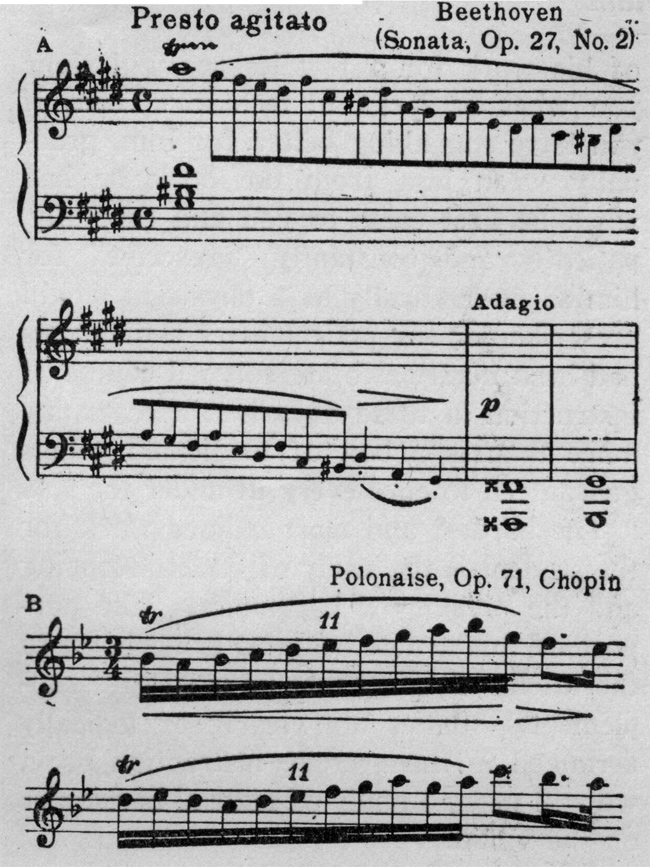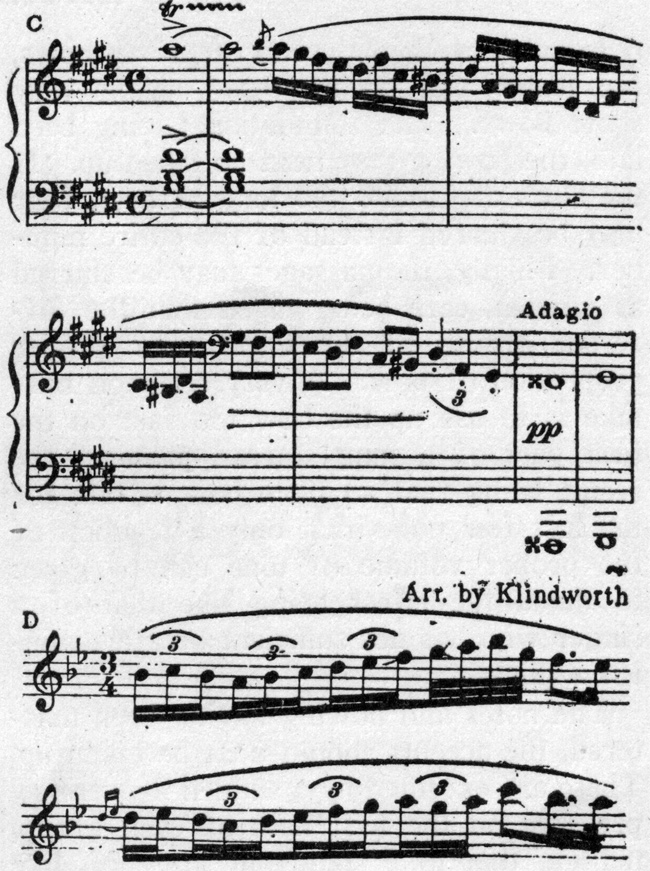Conducted by Arthur de Guichard
Always send your full name and address. No questions will be answered when this has been neglected. Only your initials or a chosen nom de plume will be printed. Make your questions short and to the point. Questions regarding particular pieces, metronomic markings, etc., not likely to be of interest to the greater number of ETUDE readers will not be considered
Standards for Teachers.
Q. Is it true that anyone wishing to teach the piano must have a high school diploma? I desire to be a pianist, but feel that in finishing my high school course I would be losing valuable time. It seems to me there are other ways of acquiring an education than by going to high school. I am in my seventeenth year and only a little over half-way through school. What shall I do?—C. W., Jamaica, N. Y.
A. As far as the writer knows, there is not at the present time any educational restriction. There has been much agitation of opinion and endeavor in that direction, but, thus far, nothing definite has been generally ordered. It is a most unfortunate state of things that anyone—no matter how little fitted or qualified—can pose as a teacher of music (any branch), insert an ad. or put out a shingle and rake in the dollars (frequently to the pupils’ lasting detriment) until he or she is discovered. (The Etude, on the other hand, sees the grave danger now arising in America through conspiracies to restrict standardization through questionable legislation of States, counties, music clubs, etc., compelling the adoption of proprietary systems, exploited purely for mercenary purposes.—Editor’s Note.)
If your high school course be efficiently conducted, you would not be “losing valuable time;” far from it. To teach anything, music especially, you must have an excellent general education. This you may acquire, at your age, through high school and college training (making a specialty of music), or with the constant teaching of a private coach plus travel.
Do not neglect your general education.
Diminished Fifths.
Q. How should a fifth be termed when it is a semi-tone less than perfect? I have heard it called both diminished and imperfect; which is correct?—Hilda, Wellesley, Mass.
A. In a measure they both are correct, especially the latter. Less than perfect is— and should be—imperfect. Unfortunately musical terminology (if there be any real “—ology” in the matter) is, all over the world, in a very questionable state. There ought to be a definite and precise understanding which would result in an exact nomenclature for every separate detail in music. Teachers and critics, for example, speak of “covered voice,” “mixed voice,” “head voice,” “falsetto voice,” even as theorists speak of “imperfect,” “diminished” and even “minor” fifths. In speaking of fifths, “minor” is wrongly used, since it means less than major, and there are no major fifths; “diminished” is equally used wrongly, because it means (in music) less than minor (nevertheless, it is very generally accepted and used in this country); whereas there is every cogent reason for the term “imperfect” fifth, since it means less than perfect. While I am forced, by general custom, to accept “diminished” as applied to a fifth, one semi-tone less than perfect, I prefer the use of the term “imperfect.”
Interpreting Difficult Passages.
Q. The answer you gave me last month about the correct way to interpret some Beethoven passages has been of so much assistance to me that I beg you will also indicate the correct way to render the following: I ask this question not because of these pieces, but to understand the principle of the thing.—M. S., Des Moines, Iowa.

A. The arrangement at “C” is by Hans von Bülow; the one at “D” is by Klindworth.

Is Musical History Necessary?
Q. Will you kindly give me your advice? I am a teacher of music, having a large class of piano pupils of various ages. Is it essential for them to learn musical history? I was never taught it; but, of course, I could read it up and teach them at the same time. But do you not think it time wasted which could be employed more profitably in practical study?—Teacher, Boston, Mass.
A. As the Englishman says, this query almost “knocked me silly!” At any rate, It required some time for me to recover from the shock! Most decidedly; every music student, no matter what branch is being studied, should “read, mark, learn and inwardly digest” the whole field of the history of music. All branches of musical art are correlated; they all spring from one common source. You cannot take one little section for practical work (big though it may seem to you) and attain to anything like excellence, to say nothing of perfection, unless you go back to the fundamentals of music in general. If you are a pianist, you want to know how your instrument is constructed; how it was invented, and why; how does it differ from the clavecin, the harpsichord, the clavichord and so forth. You are told to play the melody with a “singing-tone;” what do you know about voice and singing? Can you teach the punctuation of phrases, how and why? What do you know of the structure of chords and the resolution of discords? You have undoubtedly heard of Johann Sebastian Bach, but what do you know of Karl Philipp Emmanuel Bach and his works? Is it not of primary importance that you and your pupils should know all about the construction of music and its gradual growth throughout the ages? Then, again, a student cannot practice all the time. Some lassitude must creep in. What can be done by way of profitable relaxation? Read a chapter or two of musical history. It is both instructive and diverting; it will solve many a problem and lend added zest to work which has become somewhat tedious.
Therefore, I advise you most strongly to study and to teach your pupils the history of music, from the earliest times to the present day, and to go on studying its growth year in and year out; because music is the one art of movement which never stands still, which is always in a state of progression.
“Orphéon” and “Fanfare.”
Q. What is the difference between an “Orphéon” and a “Fanfare?” I find the terms in a French musical paper.—W. W., Washington, D. C.
A. An Orphéon is a singing club or society of male voices. A Fanfare is a brass band. The latter term is sometimes applied to a flourish of trumpets, such as that which announces the coming of the Governor in Beethoven’s Fidelio.
Accidental.
Q. What is the exact definition of an accidental.—A. R., Roxbury.
A. An accidental is any sharp, flat or natural which does not belong to the key in which the piece is written, or to any passing key, into which the composition may have made a temporary excursion.



